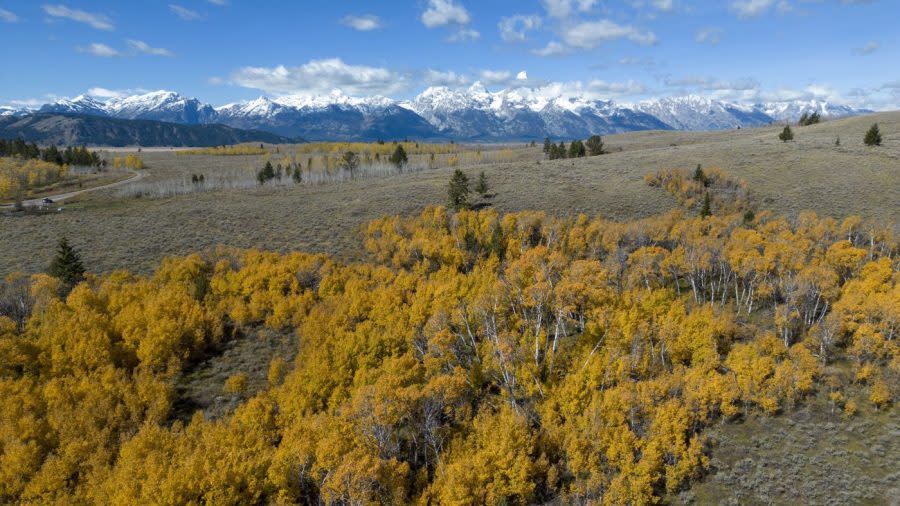Wyoming punts on contentious decision over selling Grand Teton National Park land

Wyoming state officials voted Thursday to table a disputed proposal that would have auctioned off state-owned public trust land within Grand Teton National Park.
The State Board of Land Commissioners unanimously agreed to hold additional public discussions and revisit the proposal, which focuses on a 640-acre plot called the Kelly Parcel in fall 2024.
“There’s absolutely no question that the parcel discussed today is of incredible value and really the crown jewel of Wyoming,” board Superintendent Megan Degenfelder said at a Thursday public hearing.
“As state land commissioners, we of course have a fiduciary duty to our beneficiaries to generate revenue off of state trust lands,” she continued.
Degenfelder stressed, however, the duty of the board “to roll up its sleeves to protect our state and maximize benefit,” before calling for a motion to table the vote.
The Kelly Parcel, valued at $62.4 million, is located within the exterior boundaries of Grand Teton National Park, according to an analysis drafted by Wyoming Office of State Lands and Investments Director Jenifer Scoggin.
At the time of statehood, Wyoming received school trust lands, but these parcels ultimately became part of Grand Teton National Park, per the analysis.
“This proposal has a long history associated with it,” Scoggin said at the Thursday hearing.
Wyoming’s rights on the Kelly Parcel include 100 percent of both the surface and mineral estates, the document noted, explaining that the auction would dispose of the surface estate only.
While the Board of Land Commissioners is required to generate income from school trust lands to support education, it has largely been unable to do so — producing just $2,846 annually through grazing permits, the document explained.
In the late 1990s, the board began pursuing a land exchange deal with the federal government for four public trust parcels, per the analysis.
But with no tangible progress by 2010, the agency notified the park that it “was prepared to discharge its fiduciary responsibility to manage the trust lands” and that it might sell the parcels.
Ultimately, the Department of the Interior ended up purchasing the three other outstanding parcels — Jackson Lake, Snake River and Antelope Flats — from 2010 through 2016.
After talks with the federal government ran their course, state officials determined that the Kelly Parcel, situated about 14 miles northeast of Jackson, Wyo., must “be disposed of pursuant to existing Wyoming law,” per the analysis.
As such, Scoggin placed the Kelly Parcel on a disposal list in February 2021, with the notion that such a sale could “substantially increase funds available for distribution to the state’s school districts when compared to revenues currently realized,” according to the analysis.
An updated document issued by Scoggin ahead of Thursday’s hearing suggested that “the minimum acceptable bid” should be set at $80 million — a jump from the previous $62.4 million.
Jason Crowder, deputy director of the Office of State Lands, acknowledged at the hearing that there has been widespread concern about the plans.
During the 60-day public comment period, he said that he and his colleagues held four public hearings across the state and received more than 9,000 written statements.
The Thursday vote to table the proposal until next year came as a surprise to most, as only one of the five elected officials who serve on the all-Republican board — Secretary of State Chuck Gray — had declared his opinion ahead of time.
Gray, an outspoken supporter of former President Trump, contended that “selling off such an invaluable piece of property in Teton County is not in the best interests of the State of Wyoming.”
“I also remain skeptical that the appraisal brought forward matches the true value of this priceless piece of property,” Gray said in a statement.
Environment and conservation groups have likewise been vocal in expressing their opposition to the public lands disposal.
The National Wildlife Federation Action Fund, for example, has advocated for a no-vote with hopes of conserving the moose habitat in Grand Teton National Park.
Ted Kerasote, a nature and wildlife writer, penned a New York Times opinion piece a day before the hearing, describing the Kelly Parcel as “a crucial choke point in the migratory journey of pronghorn and mule deer during their arduous annual migration.”
The Greater Yellowstone Coalition, meanwhile, identified “an indescribably important parcel of land” that is “under imminent threat of being transformed into mega-mansions.”
Before motioning to table the proposal at the Thursday hearing, Degenfelder emphasized the importance of accounting for “the reinvigorated voice of the people.”
The superintendent also stressed a need “to let the federal government know that they cannot just roll over Wyoming.”
“They need to come to the table, negotiate, so we can protect the Kelly parcel for citizens across the entire country,” she added.
The board’s treasurer, Curt Meier, echoed these sentiments, adding that there are also potential opportunities for land easements or trades for affordable housing in Teton County.
Meier said he would try to ensure the land produced a “revenue stream, which would be revenue off of each income,” rather than just a direct sale. He noted this could occur by making some exchanges.
Degenfelder, meanwhile, encouraged fellow officials to proceed with a workgroup that might be able to negotiate such trades with the Interior Department.
“There are other options than the auction that we have on the table today,” she said. “I think we just need more time to work on this.”
For the latest news, weather, sports, and streaming video, head to The Hill.

